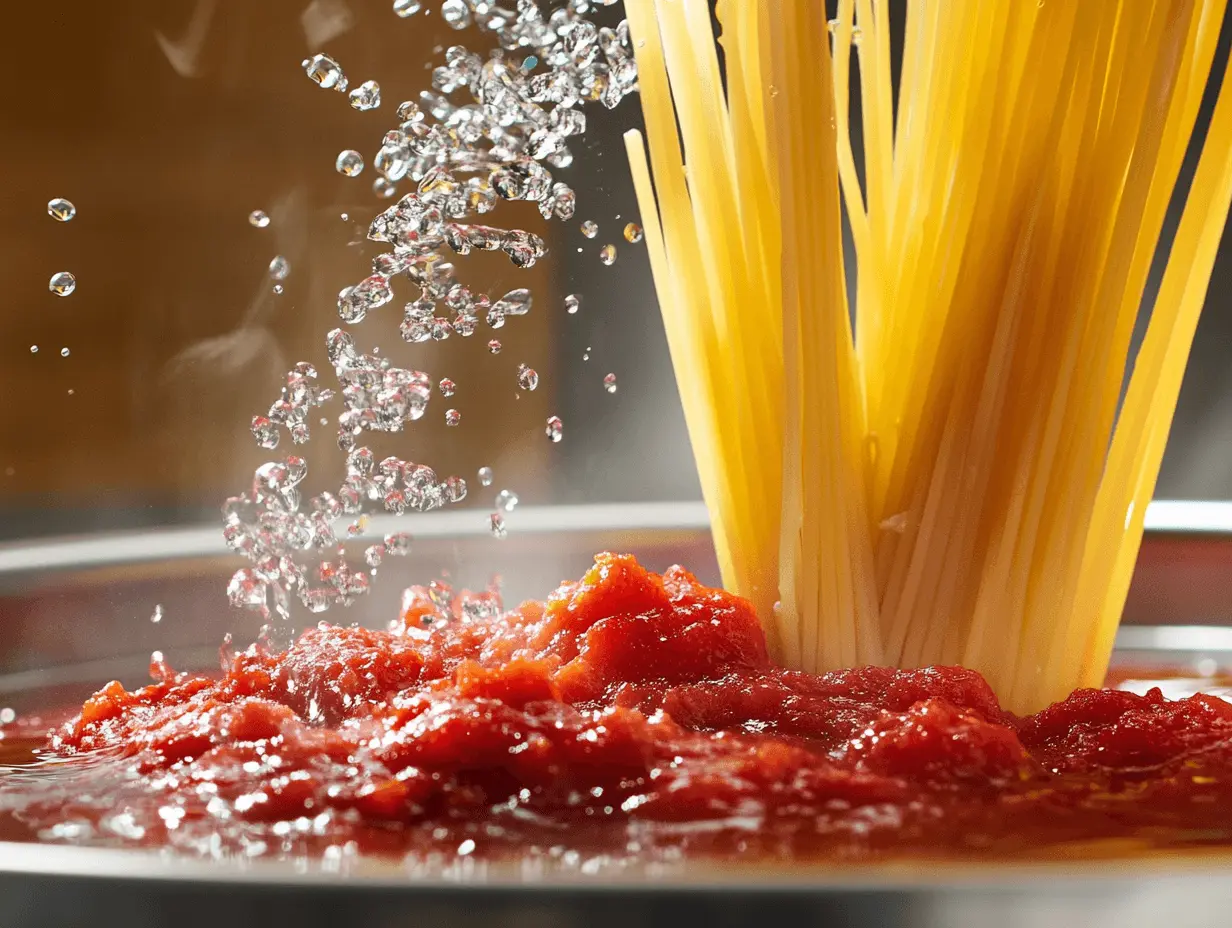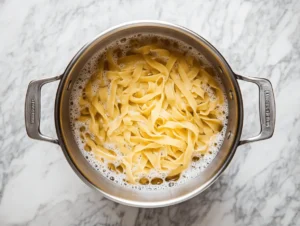Introduction
Ever wondered if chickpea pasta water can actually thicken sauces the same way as traditional pasta water? In this article, we’ll explore how this simple, yet versatile kitchen ingredient—often discarded—can be your secret weapon for creating perfectly thickened, flavorful sauces. Chickpea pasta has gained popularity due to its high protein content, fiber, and gluten-free benefits. But what about the pasta water? Let’s dive into this, because understanding its potential will change the way you cook.
Introduction to Chickpea Pasta
Chickpea pasta is quickly becoming a go-to choice for health-conscious eaters. Packed with protein, fiber, and nutrients, it’s an excellent gluten-free alternative to traditional pasta. Chickpea pasta is not just for the health-focused, though—it’s delicious, filling, and versatile in the kitchen. Whether you’re whipping up a hearty dish or a light salad, chickpea pasta works wonders. But here’s the thing: it’s not just about what’s on your plate—it’s also about the water you use to cook it. The starchy liquid left behind after cooking chickpea pasta can actually thicken sauces and bring them to life.
What is Chickpea Pasta Water?
Chickpea pasta water is the starchy water left over after cooking chickpea pasta. The water contains released starches from the chickpeas that help thicken sauces, much like the water from regular pasta. This starch-rich liquid can be used to adjust the texture of sauces, making them creamier and more cohesive. Chickpea pasta water might even offer a slight nutty flavor, giving your sauces a unique depth.
The Science Behind Pasta Water and Its Effect on Sauces
The Role of Starch in Pasta Water
Ever noticed how pasta water has that cloudy look? That’s all thanks to the starch that’s released from the pasta as it cooks. When pasta, whether it’s made from wheat or chickpeas, is boiled, it releases starch into the water, making it an excellent tool for thickening sauces. So, what exactly happens here? As pasta cooks, the starch molecules seep out into the water, creating a gelatinous consistency that helps sauces thicken and adhere to the pasta. It’s almost like magic—without the need for cream or flour.
Chickpea pasta water works similarly, though there are some key differences. Chickpeas, being legumes, release slightly different starches compared to wheat. These starches still bind with sauces, giving them that rich texture that we all crave. While chickpea pasta water won’t produce the same exact results as wheat pasta water, it’s still an effective thickening agent, adding creaminess and allowing sauces to cling better to the pasta.
Does Chickpea Pasta Water Work the Same as Traditional Pasta Water?
Now, you may be wondering—does chickpea pasta water work the same as the water from traditional wheat pasta? Well, kind of. Both pasta waters contain starch, but the types of starch and their concentrations vary. Chickpea pasta water tends to be a bit thicker and has a nutty flavor, thanks to the chickpeas themselves. This can actually work in your favor, especially if you’re cooking a rich tomato sauce or a creamy vegan dish.
So, while chickpea pasta water isn’t an exact replacement for traditional pasta water, it still gets the job done! It can thicken your sauces just as effectively, without the need for additional thickeners like cornstarch or flour. Plus, it adds a layer of nutrition, since it’s packed with protein and fiber. Simply put, it’s a great tool to have in your culinary arsenal!
Practical Uses of Chickpea Pasta Water in Sauce Making
How to Use Chickpea Pasta Water to Thicken Sauces
So, how do you use chickpea pasta water to thicken your sauces? The process is pretty simple, but it can make a huge difference in the texture of your dish. Start by saving a cup or so of the water before draining the pasta. You don’t need much—just enough to help loosen the sauce and give it a nice creamy finish.
Here’s the trick: after your sauce is simmering, gradually add the chickpea pasta water a little at a time. Stir continuously as you go, until the sauce reaches the desired thickness. It’s best to add the water slowly so you can control the texture—if you add too much, you might end up with a sauce that’s too thin. But with a little practice, you’ll be able to perfect the art of using pasta water to thicken sauces.
The beauty of chickpea pasta water is that it doesn’t just thicken the sauce, it also makes it cling to the pasta better. The starch in the water helps the sauce coat the pasta evenly, ensuring each bite is just as flavorful as the last.
Benefits of Using It for Sauce
Using chickpea pasta water to thicken sauces comes with more than just a texture benefit. First, it’s incredibly nutritious. Unlike plain water, pasta water contains protein, fiber, and other nutrients from the chickpeas themselves. This means you’re adding extra nutrients to your dish without any extra effort. Not only does it help the sauce thicken, but it also boosts the overall nutrition of your meal.
Another advantage is sustainability. By using pasta water, you’re reducing waste in the kitchen. Instead of tossing out the leftover cooking liquid, you’re putting it to good use. So, not only are you making your sauces better, but you’re also making your cooking a little more eco-friendly. Plus, the slight nutty flavor in the chickpea pasta water can enhance the taste of your sauce, giving it a deeper, more savory finish.
In short, using chickpea pasta water is a win-win: it thickens your sauces, adds nutrients, and helps you make the most of what you’ve already cooked.
Comparing Chickpea Pasta Water with Other Thickeners
Chickpea Pasta Water vs. Cornstarch
Cornstarch is a quick and effective thickener, but it’s very concentrated and often gives sauces a slick texture. Chickpea pasta water, on the other hand, thickens more gradually, creating a natural, creamy consistency. Unlike cornstarch, it adds nutrients like protein and fiber to your dish and brings a subtle nutty flavor that complements most sauces. While cornstarch is ideal for instant results, chickpea pasta water is a more sustainable and flavorful option.
Chickpea Pasta Water vs. Flour
Flour is commonly used to make a roux for thick sauces, but it can create a heavier texture and requires careful cooking to avoid lumps. Chickpea pasta water, by contrast, is lighter and easier to use—just stir it into your sauce for a smooth, velvety finish. It’s also gluten-free, making it a healthier alternative for those avoiding gluten. Best of all, it enhances both tomato-based and cream-based sauces while adding an extra boost of nutrition.
Chickpea Pasta Water for Vegan and Plant-Based Sauces
Why is It Ideal for Vegan Sauces
If you’re cooking a vegan or plant-based dish, chickpea pasta water can be a game-changer. Traditional thickeners like butter or cream are off-limits for vegan recipes, but chickpea pasta water steps in to save the day. Its natural creaminess and starchy consistency make it the perfect alternative for creating smooth, rich sauces without any dairy. Whether you’re making a vegan Alfredo or a tomato-based marinara, this nutritious liquid adds a layer of depth without compromising on flavor.
The subtle nutty flavor from the chickpea pasta water can also enhance plant-based sauces. It complements vegetables and legumes, enriching the sauce while maintaining a light texture. So, if you’re looking to boost the creaminess in your vegan dishes, chickpea pasta water is an excellent go-to ingredient.
Chickpea Pasta Water in Plant-Based Cream Sauces
Plant-based cream sauces often rely on nuts, tofu, or plant milks for their base. However, adding chickpea pasta water can give them a silky finish that mimics the richness of traditional cream sauces. The starch in the pasta water helps bind the sauce together, making it smooth and velvety, without the need for excessive amounts of oil or dairy alternatives.
By adding just a bit of chickpea pasta water, you can elevate your plant-based cream sauces, achieving the perfect consistency for vegan mac and cheese or even a creamy pesto. It’s an easy way to add texture and nutrients without complicating your recipe. Plus, it’s a great way to ensure your plant-based dishes are satisfying and flavorful!
Common Mistakes to Avoid When Using The Water
Over-Thickening the Sauce
One of the most common mistakes when using chickpea pasta water to thicken sauces is adding too much. Sure, it’s tempting to just pour it in without measuring, but too much pasta water can quickly turn your sauce into a pasty mess. The starch in the water thickens sauces slowly, and adding too much at once can create an overly thick, sticky texture that’s hard to fix.
To avoid this, always add chickpea pasta water gradually while stirring. Start with a small amount and adjust as needed. You can always add more if your sauce is too thin, but it’s much harder to thin out a sauce that’s been over-thickened. A little patience goes a long way when it comes to perfecting the sauce’s consistency!
Under-Thickening the Sauce
On the flip side, another common issue is not adding enough pasta water. If you’re aiming for a creamy sauce and find that your dish is still a bit too thin, don’t hesitate to add a bit more chickpea pasta water. It might take a few tries to get the ratio just right, but adding too little will leave your sauce lacking that rich texture.
The key here is to taste as you go. Add a small amount of pasta water, stir, and check the consistency. Don’t be afraid to add a little more to get that perfectly velvety texture. Using chickpea pasta water to its full potential ensures that your sauce is both thick and delicious, without any of the usual thickening struggles.
Frequently Asked Questions (FAQs)
Does Chickpea Pasta Water Thicken Sauce Like Regular Pasta Water?
Yes, chickpea pasta water can thicken sauces, just like traditional pasta water. The starch released from chickpea pasta during cooking creates a slightly cloudy, gelatinous liquid that helps bind and thicken sauces. While chickpea pasta water may not be as starchy as wheat pasta water, it still provides enough creamy texture to enhance your sauces, making them silky and rich.
Can You Use Chickpea Pasta Water for Vegan Sauces?
Absolutely! Chickpea pasta water is a fantastic addition to vegan sauces. It provides the necessary creaminess without any dairy, making it perfect for plant-based dishes. Whether you’re making a vegan Alfredo or a tomato-based marinara, chickpea pasta water can help thicken the sauce while adding a subtle nutty flavor.
How Much Chickpea Pasta Water Should I Use to Thicken My Sauce?
Start with about a half cup of chickpea pasta water and add it gradually to your sauce. You can always add more if the sauce is still too thin. Stir continuously to allow the starch to integrate into the sauce. This will help you control the sauce’s thickness and prevent it from becoming too thick.
Is It Good for Making Gluten-Free Sauces?
Yes, chickpea pasta water is an excellent choice for gluten-free sauces. It’s naturally gluten-free and can help thicken sauces without using flour or other gluten-based thickeners. It’s also a great way to make your gluten-free dishes more satisfying and nutritious.
Can I Save Chickpea Pasta Water for Later Use?
Yes, you can store chickpea pasta water for later use. Simply let it cool and keep it in an airtight container in the refrigerator for up to 2-3 days. This makes it easy to save extra pasta water for future meals, reducing waste and ensuring you have a thickening agent on hand whenever needed.
Does It Add Flavor to Sauces?
Yes, chickpea pasta water does add a subtle nutty flavor to sauces, which can enhance the overall taste of your dish. This is especially beneficial when making vegan or plant-based sauces, where the addition of flavor is key to making the dish more savory and satisfying.
Conclusion
So, does chickpea pasta water thicken sauce? Absolutely! Using chickpea pasta water to thicken sauces is a simple yet incredibly effective way to enhance both the texture and nutrition of your dishes. Whether you’re preparing a hearty tomato sauce, a smooth vegan Alfredo, or a flavorful pesto, the starchy liquid left behind from cooking chickpea pasta works wonders in achieving that creamy, velvety consistency.
Chickpea pasta water not only thickens sauces naturally, but it also adds a subtle nutty flavor and provides extra protein and fiber to your meal. It’s an easy, sustainable alternative to traditional thickeners like cornstarch or flour, allowing you to create rich, satisfying sauces without compromising on taste or texture. Plus, by using the pasta water instead of tossing it out, you’re being more resourceful and reducing kitchen waste.
Next time you cook chickpea pasta, remember to save that valuable liquid! It’s an incredibly versatile ingredient that can elevate your sauces while boosting the nutritional value of your meal. Whether you’re looking to thicken your sauce or simply add a little extra richness, chickpea pasta water is your new best friend in the kitchen.


